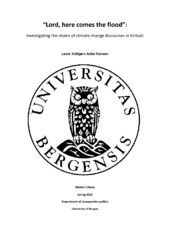| dc.description.abstract | This thesis is aimed at uncovering the chains of climate change discourses in Kiribati. Building a theoretical and analytical framework from literature on accountability and responsiveness, I separate between four dimensions of discourses on climate change: the electoral channel, the state actor interactions, non-electoral citizen participation, and finally, the non-domestic interactions. This is supplemented by previous research on small and island states, cultural and historical aspects related to politics in the Pacific, as well as studies on domestic climate change policy formation. An exploratory single-case study is done using data triangulation with a main emphasis on elite and expert interviews conducted during fieldwork on Fiji and Kiribati in early 2012. Through interviews with centrally placed political, organizational, bureaucratic and academic persons I have been able to secure inside accounts of the phenomenon under scrutiny. This has been corroborated by documentary, archival and to a certain degree observational data. The main findings are that there is little interaction on broad climate change policies in Kiribati between political actors, and the discourses that do exist are dominated by the government. However, citizens, parliament and civil society seem more inclined to engage the government on concrete, street level" issues. The government also interacts with non-domestic actors frequently on climate change, but due to a reliance on foreign technical and financial assistance, the former is in a disadvantaged position in this relationship most times. Drawing on previous literature on small states, climate change policy formation and accountability theory, I am able to set forth hypotheses explaining these results. Structural, institutional and cultural factors work together with the valence-ness of the climate change issue to create limited discourses outside government circles. At the same time, these causal effects also contributed to the interactions on climate change being mainly focused on concrete events that perhaps could be traced back to climate change, such as coastal erosion, but without this being done explicitly in most cases. I conclude that it is hard to see how one can easily change the structural conditions that are inherent to the country's smallness and isolation. An implication of my hypothesized causal relationships is that non-domestic actors are playing, and must continue to play, an important role in strengthening the capacity and ability of all political actors in Kiribati. However, more research is needed to determine whether the factors set forth are necessary or sufficient to create the lack of climate change discourse beyond street level" implementations observed. | en_US |
